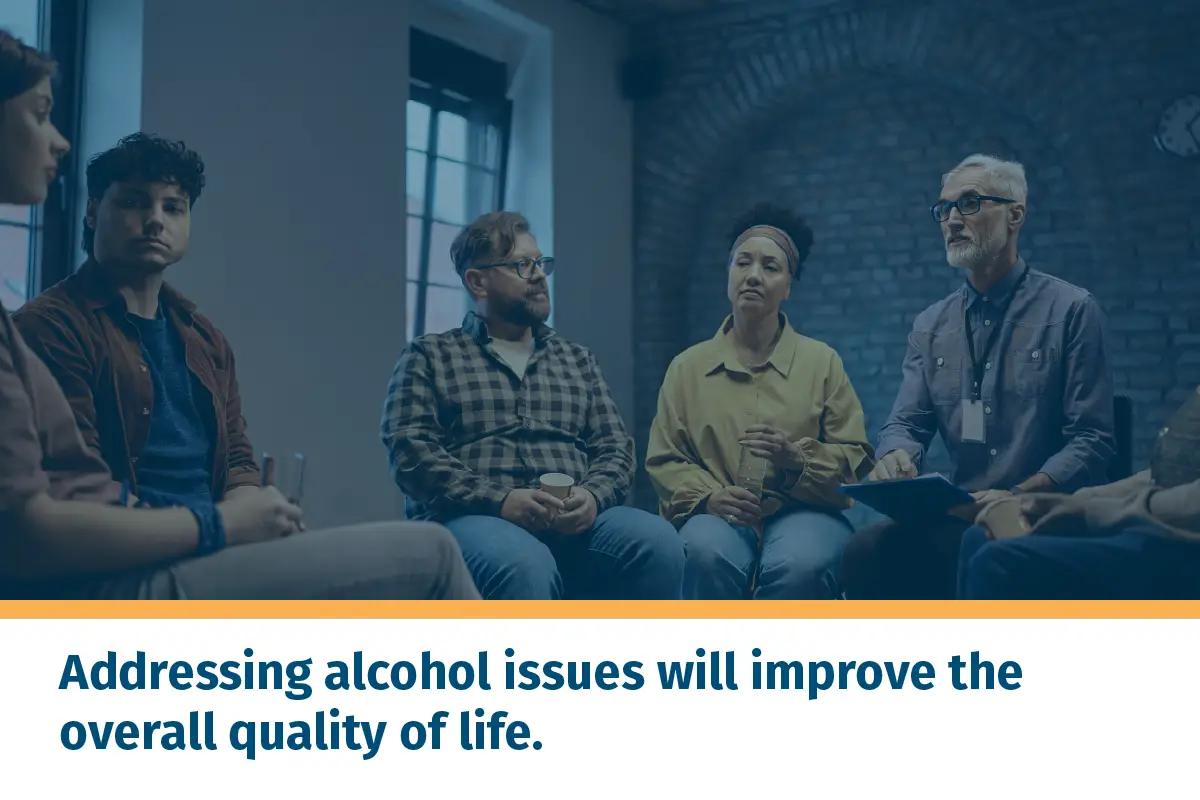Alcohol Addiction Treatment
More Resources
Call us today to get the support and guidance you deserve.
Understanding Alcohol Addiction and Its Impact
For many, alcohol can feel like a way to unwind after a stressful day. But when drinking becomes a regular habit, it can quickly turn into something more difficult to manage.
Alcohol addiction, or alcohol use disorder, happens when alcohol consumption becomes excessive and consistent. This leads to the body relying on alcohol just to feel normal in everyday life.
Alcoholism is the most common substance use issue in the U.S., affecting more than 28 million people aged 12 and older in 2020 alone.
Reaching out for help with alcohol can feel like a big step, but it’s an important one. You don’t have to go through this alone. With the right support and care, it’s possible to move past alcohol dependency and work toward lasting change.
Key Takeaways
Alcohol addiction can start as a way to relax but quickly turn into a serious issue that affects many areas of life. It impacts your safety, relationships, work, and health. Recognizing the signs and understanding their causes can help you take the first step toward getting the support and treatment needed to regain control.
- Alcohol misuse can impact safety, relationships, employment, and health. Recognizing the signs early and understanding these effects can help prevent further complications.
- Genetics, mental health conditions, environmental factors, and stress can all contribute to the development of alcohol addiction. Identifying these risk factors is key to addressing the issue.
- Medically supervised detox, therapy, and ongoing support can help manage alcohol addiction. With the right treatment, it’s possible to regain control and improve quality of life.
Symptoms of Alcohol Addiction
There are several signs that can indicate alcohol abuse. While some may be easy to recognize, others can be harder to detect. The severity of alcohol misuse often influences how these signs show up. Below are common symptoms of alcohol addiction:
- Increased isolation from family and friends
- Drinking more frequently or in larger amounts than intended
- Difficulty controlling or stopping drinking
- Prioritizing alcohol over other responsibilities or activities
- Neglecting personal health or hygiene
- Experiencing mood swings, irritability, or anxiety when not drinking
- Denying or minimizing the extent of alcohol use
- Developing a tolerance, requiring more alcohol to feel the same effects
- Experiencing withdrawal symptoms, such as shaking, sweating, or nausea, when not drinking
These symptoms can be a sign that alcohol use is becoming a problem. If you or someone you care about is showing any of these signs, it’s important to take them seriously. Early intervention and support can make a significant difference in addressing alcohol misuse and preventing further complications.
Most insurance plans cover treatment here, making the cost to you as low as possible - sometimes even zero.






What Causes Alcohol Addiction?
Alcohol addiction can develop due to a variety of factors, often working together to make it difficult for a person to stop drinking. Understanding these causes can help identify potential risks and provide better support for those struggling with alcohol use.
- Genetics: A family history of alcohol addiction can increase the risk, as certain genetic factors may make individuals more prone to developing a dependency on alcohol.
- Mental Health Conditions: People dealing with anxiety, depression, or other mental health issues may use alcohol as a way to cope, leading to a higher risk of addiction.
- Environmental Factors: Growing up in an environment where alcohol misuse is common or experiencing stressors such as trauma or difficult life situations can contribute to the development of alcohol addiction.
- Social Pressure: Peer pressure or societal norms that encourage heavy drinking, especially in social settings, can influence the onset of alcohol misuse.
- Chronic Stress: Ongoing stress from work, relationships, or personal issues can lead individuals to use alcohol as a way to temporarily escape or numb their feelings.
- Coping Mechanism: Some people turn to alcohol to cope with emotional pain, past trauma, or difficult life events, which can lead to dependency over time.
How Alcohol Addiction Impacts Your Life
Drinking alcohol can have both immediate and lasting consequences. While short-term effects may only last a few hours or days, the long-term effects can impact you for years to come.
The more frequently alcohol is consumed, the greater the risk of developing problems that affect daily life. Understanding how alcohol affects various aspects of your life is crucial in recognizing potential risks.
Alcohol can severely impair your ability to make sound decisions, putting you at greater risk for accidents. It can lower your inhibitions and affect your coordination, leading to an increased chance of car crashes, falls, or other physical injuries. Additionally, alcohol can make you more vulnerable to dangerous situations, engaging in risky behaviors that compromise your safety.
Alcohol addiction often creates strain in relationships with family, friends, and partners. The effects of alcohol misuse, such as mood swings, irritability, or secrecy, can lead to conflicts and misunderstandings. Isolation may also occur as people struggling with addiction withdraw to avoid confrontation or hide their drinking, making it harder for loved ones to offer support.
Alcohol addiction can have a major impact on your work life. It can lead to missed workdays, poor job performance, or conflicts with colleagues and supervisors. As alcohol dependency grows, it may become more difficult to focus, meet deadlines, or maintain the necessary professionalism, which could jeopardize your job and future career prospects.
The physical toll of alcohol addiction can be long-lasting and severe. Over time, excessive drinking can contribute to a range of health problems, including liver disease, heart issues, and digestive disorders. Mental health can also be affected, as alcohol misuse is linked to anxiety, depression, and other mental health conditions. Early intervention and support can help prevent further health complications.

What to Expect in Alcohol Treatment
Overcoming an alcohol addiction can be a long and winding road. It may even feel impossible at times. But it isn’t.
If you’re ready to quit drinking and prepared to get the help you need, you can overcome your drinking problem, no matter how much you drink or how powerless you feel.
There are many effective alcohol addiction treatment options available. Most rehab centers use some or all of the following treatment methods:
Supervised Detox and Withdrawal Management
Medically supervised detox helps safely manage withdrawal symptoms and ease the transition into treatment.
Therapy and Counselling
Therapy and counseling provide personalized support to address the emotional and psychological aspects of alcohol addiction.
Inpatient and Outpatient Treatment Options
Inpatient and outpatient treatment options offer flexibility, allowing you to choose the level of care that fits your needs.
Ongoing Support
Ongoing support through aftercare services and support groups helps maintain sobriety and prevent relapse after treatment.
Related Alcohol Articles

Here’s What We’ll Cover Here’s What We’ll Cover When you’re addicted to alcohol, you reach

Here’s What We’ll Cover Here’s What We’ll Cover We all experience grief at some point

Here’s What We’ll Cover Here’s What We’ll Cover Expectant mothers often have questions about how

Here’s What We’ll Cover Here’s What We’ll Cover Navigating the fine line between responsible alcohol

Here’s What We’ll Cover Here’s What We’ll Cover Ethanol abuse, commonly known as alcohol abuse,

Here’s What We’ll Cover Here’s What We’ll Cover Alcoholism is a complex issue that affects
Give us a 5-minute call for more information about our services. There is no commitment or judgement – we’ve been there before ourselves.
Contact us for more information :
Call Us
(800) 817-1247
Verify Insurance
100% Confidential
